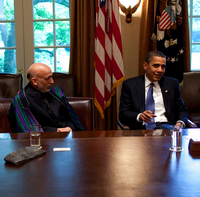Are the deck chairs being reshuffled on the Titanic that is the Afghan war? First, Afghan President Hamid Karzai forced the resignations of his interior minister, Hanif Atmar, and the head of his intelligence services, Amrullah Saleh. Next, the U.K. special envoy to Afghanistan and Pakistan, Sherard Cowper-Coles, went on indefinite leave, turning over his post to his deputy. Now, in the aftermath of the infamous Rolling Stone profile, U.S. President Barack Obama has removed Gen. Stanley McChrystal as commander of U.S. and coalition forces in Afghanistan, replacing him with Gen. David Petraeus.
What is interesting to note, of course, is that each of these men left or was forced out from his post for holding quite different views about the way forward in Afghanistan. Atmar and Saleh have opposed Karzai's "plan B" of reaching out to the Taliban through negotiations to try and bring them into a government of national unity. They were also among the most pro-American members of his cabinet. So perhaps Karzai was worried by the Soviet-era precedent of Moscow replacing ineffective Afghan communist leader Babrak Karmal with his intelligence chief Najibullah back in 1986, and wanted to forestall a replay of this scenario in 2010.
Cowper-Coles, Britain's counterpart to America's Richard Holbrooke, was an opponent of the U.S.-proposed "surge" in Afghanistan, arguing that there would be no military solution and that Karzai's strategy of negotiations was the only way forward to extricate the West from the apparent quagmire it faces in the mountains of the Hindu Kush. His strongly advocated position -- reiterated in a recent speech in London -- was creating a wave of cognitive dissonance within the ranks of the U.S.-NATO mission, putting him at odds with the rest of the team.

